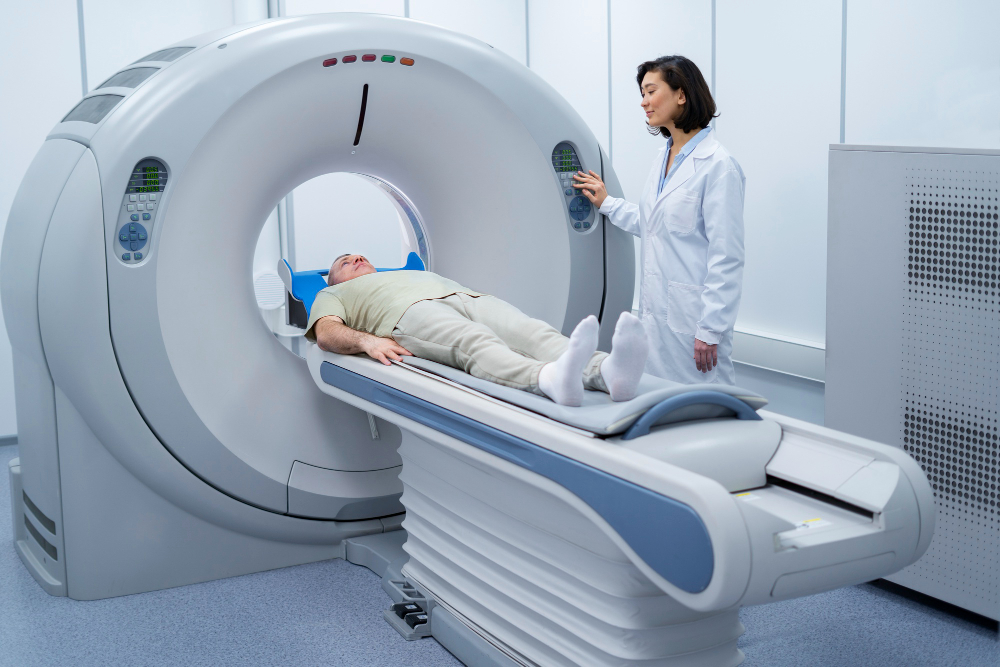PET Scan for Brain: What You Should Know?
April 27, 2024
In the complex field of medical diagnostics, PET scans are an amazing technology, particularly when it comes to looking into the complex workings of the human brain. But what exactly is a PET scan, and how does it show the inner workings of the most complicated organ of the human body? Let's have a deep insight and understand why PET scans are so crucial in neuroscience.
What is a PET Scan?
PET, or Positron Emission Tomography, is a non-invasive imaging technique that allows medical professionals to observe metabolic processes in the body. Unlike traditional imaging methods like X-rays or MRIs, which primarily capture structural details, PET scans dive deep into the functional aspects of tissues and organs, including the brain.
How Does a PET Scan Work?
PET scans are technically based on the concept of radioactive tracers. These tracers are compounds labeled with a small amount of radioactive material, which emits positrons (a type of positively charged particle) as they decay. When injected into the body, these tracers travel to specific organs or tissues and collect information based on metabolic activity.
In the context of brain imaging, tracers such as fluorodeoxyglucose (FDG) are commonly used. FDG is a glucose analog that behaves just like the natural glucose in the body. Since glucose serves as a primary energy source for cells, areas of heightened activity in the brain will exhibit increased uptake of FDG.
Once the tracer is distributed throughout the brain, the PET scanner detects the emitted positrons. By analyzing the distribution and intensity of these signals, radiologists can generate detailed images that highlight areas of metabolic activity within the brain.
Why is PET Imaging Important for Brain Health?
The brain is rushed with various activities, constantly engaged in countless processes, from regulating basic bodily functions to handling complex thoughts and emotions. Understanding the metabolic activity within different parts of the brain is crucial for diagnosing and managing various neurological conditions.
PET scans play an important role in the diagnosis and treatment planning of conditions such as Alzheimer's disease, Parkinson's disease, epilepsy, and brain tumors. By highlighting areas of abnormal metabolic activity, doctors can make more accurate decisions regarding treatment strategies, including surgery, radiation treatment, or medication.
Furthermore, PET imaging is instrumental in monitoring disease progression over time. By conducting successive scans, doctors can track changes in metabolic patterns and assess the effectiveness of interventions, thereby optimizing patient care.
What to Expect During a PET Scan?
Undergoing a PET scan is a relatively simple process. Patients are first administered the radioactive tracer via injection, ingestion, or inhalation, depending on the specific tracer and imaging protocol. After a short waiting period to allow the tracer to circulate in the body, the patient is positioned on a comfortable scanning table and moved into the PET scanner.
During the scan, it's essential to remain as still as possible to ensure clear and accurate imaging. The scanning process itself is painless and typically lasts anywhere from 30 to 90 minutes, depending on the specific imaging protocol and the area of the body being examined.
Once the scan is complete, the images are analyzed by expert radiologists in Mohali, such as radiologists or nuclear medicine physicians, who interpret the results and provide valuable insights into the patient's condition.
How Sohana Hospital Can Help
At Sohana Hospital Mohali, we understand the significance of advanced imaging techniques in diagnosing and treating neurological disorders. Our state-of-the-art facilities, coupled with a team of expert radiologists in Mohali, enable us to deliver comprehensive care tailored to each patient's unique needs.
With cutting-edge PET imaging technology and a patient-centric approach, Sohana Hospital is committed to providing accurate diagnoses and personalized treatment plans for individuals facing neurological problems. Whether you're seeking answers for anxiety, movement disorders, or other neurological symptoms, our highly experienced team is here to guide you every step of the way.
PET scans offer a window into the inner workings of the brain, allowing doctors to explore its complexities with accuracy. We can get more details about neurological disorders and their solutions through PET CT scans and metabolic imaging and we can predict the precise outcomes.

